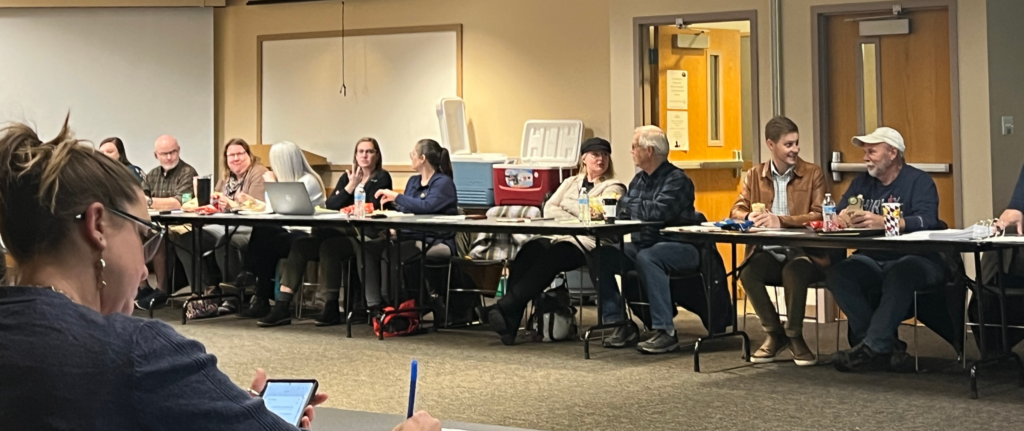COEUR d’ALENE — More than 50 area leaders gathered in Coeur d’Alene on November 7 to explore strategies to increase housing for local workers.
Coeur d’Alene City Councilor Kiki Miller, a founder of the Housing Solutions Partnership, said 24 of 30 categories of local workers — including police officers, teachers and even chief executives — are priced out of buying a home in Kootenai County.
“Decision makers and all of us who live here are going to have to get our head around these numbers,” Miller said. “The numbers aren’t changing, and the shortage of affordable worker housing is going to impact us all directly. The data that helps show us how, including commuter projections reports and the effects of short-term rentals, is an ongoing, key component to the partnership’s work.”
The partnership’s third annual Housing and Growth Workshop underscored the need for more housing for local workers and detailed the partnership’s efforts to address the county’s housing crisis.

A 2023 housing study forecasted a need for 27,388 additional housing units in Kootenai County by 2030. The anticipated supply of homes falls far short, Miller said.
Miller said the partnership’s goal is not to create housing for everyone who wants to live in Kootenai County, but to accommodate the workforce needed to keep the community operating and meet growth projections.
Gynii Gilliam, executive director of the Coeur d’Alene Economic Development Council, said housing has become a primary focus for economic development groups seeking to help businesses hire and retain a workforce. Local FedEx feeder Empire Airlines, for example, wanted to hire five interns last year but couldn’t because of a lack of local housing options, she said.
“The housing crisis has had a direct impact on our ability to recruit and retain talented workers,” said Pete Broschet, Empire Airlines’ Director of Human Resources. “Without affordable housing options, we face significant challenges in attracting the workforce needed to sustain our operations and grow our business. It’s not just about finding skilled candidates, but also ensuring they have a place to live that’s accessible and affordable.”
Miller said the Solutions ToolKit developed by the partnership contains several strategies for increasing affordable housing for local workers. Some have been successfully launched — like HomeShare Kootenai County — while others are in-progress or at the exploratory stage.
The partnership plans to launch a series of podcasts to share local housing data and highlight items from the Solutions ToolKit.
“We have to start thinking hard about being more creative,” Miller said.
She said the partnership has reached out to many, including state representatives, to consider creating a funding mechanism for the Idaho Housing Trust Fund. Though it was established by legislators in 1992 to support affordable housing through the Idaho Housing and Finance Association, no funding mechanism was created.
“The tool exists, but there is no funding,” Miller said.
Other states have used a portion of recording fees when homes change hands or fees levied when a property is sold to support their housing trust funds. Tax credits have been used successfully and are in upcoming conversations locally.
Miller also raised the possibility of a local option tax like Utah voters approved to support local worker housing. Developer incentives could also boost the effort for affordable housing, she said.
Local developers and jurisdictions have created lists of potential incentives such as waivers on parking requirements, increased density or fast-tracking of permits to encourage builders to build housing at lower price points. All of these are items in the partnership’s ToolKit and are being discussed and developed.
During the November 7 workshop, Senior Transportation Planner Ali Marienau of the Kootenai Metropolitan Planning Organization discussed how growth has impacted traffic planning. Local jurisdictions addressed their efforts to gain ground on the housing shortage.
Post Falls Community Development Director Bob Seale said the city is working on a housing needs assessment. The city has approved cottage home and tiny home standards and is seeing the first projects of those kind under construction.
Coeur d’Alene Planning Directory Hillary Patterson said the city is considering allowing twin homes on lots where duplexes are allowed and considering increased incentives for affordable housing in the downtown area.
Hayden changed its development code to allow smaller, stick-built homes on lots in manufactured home parks and is looking at developments with a hybrid of housing types, some of which may be deed restricted.
Miller said some in the community are skeptical of whether anything can be done at this point to change the trajectory of the housing crisis, but she said Kootenai County is making far more progress than other communities with similar housing challenges.
She told workshop attendees about the partnership’s recent award from the American Planning Association’s Idaho Chapter.
“The partnership was recognized statewide as an organization that is ahead of the curve tackling the housing crisis,” she said. “The work the partnership is doing can be replicated throughout the state.”
The workshop was sponsored by HMH Engineering and the Idaho Housing and Finance Association.
The mission of the Housing Solutions Partnership is to increase the availability and affordability of housing for local workers in North Idaho. Learn more about the partnership at www.housingni.org
